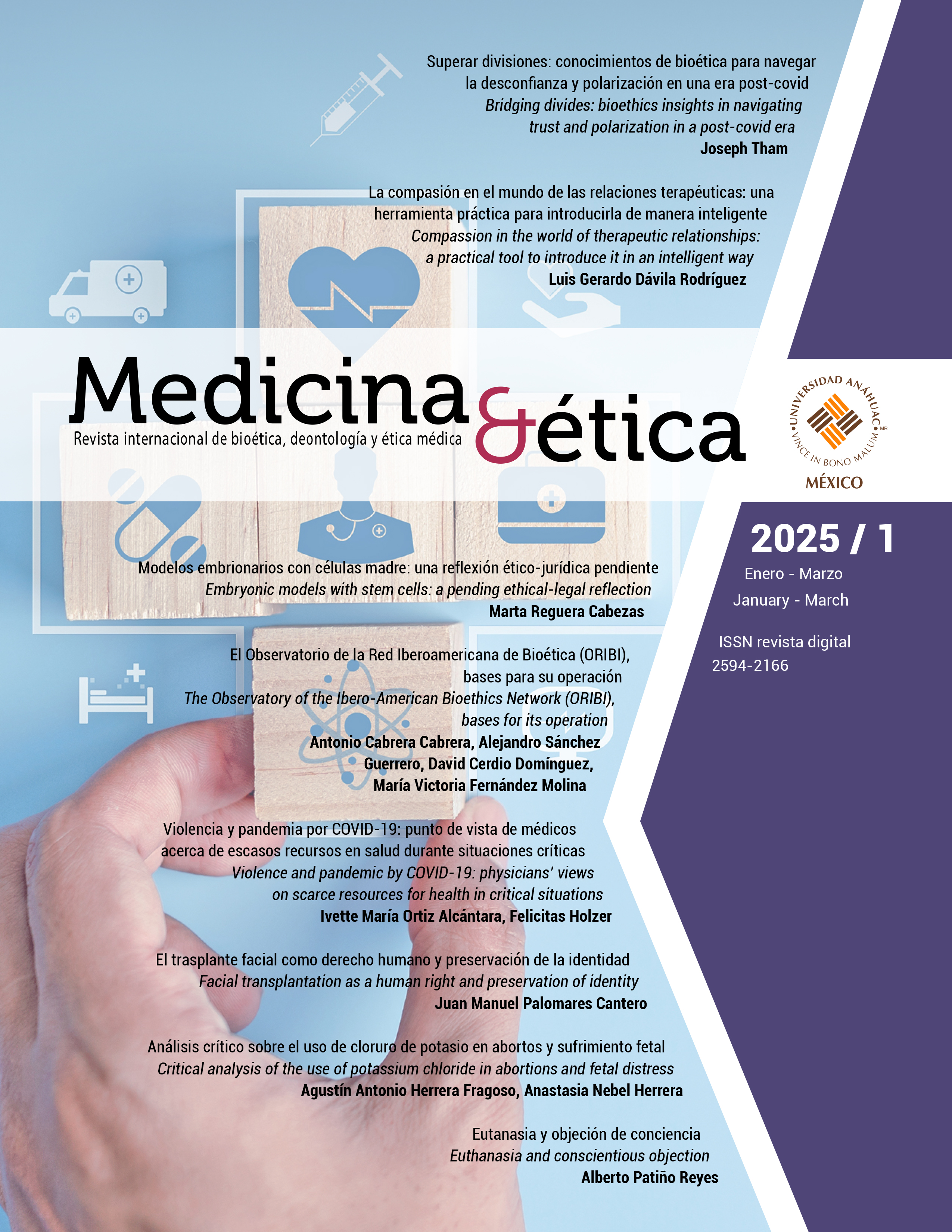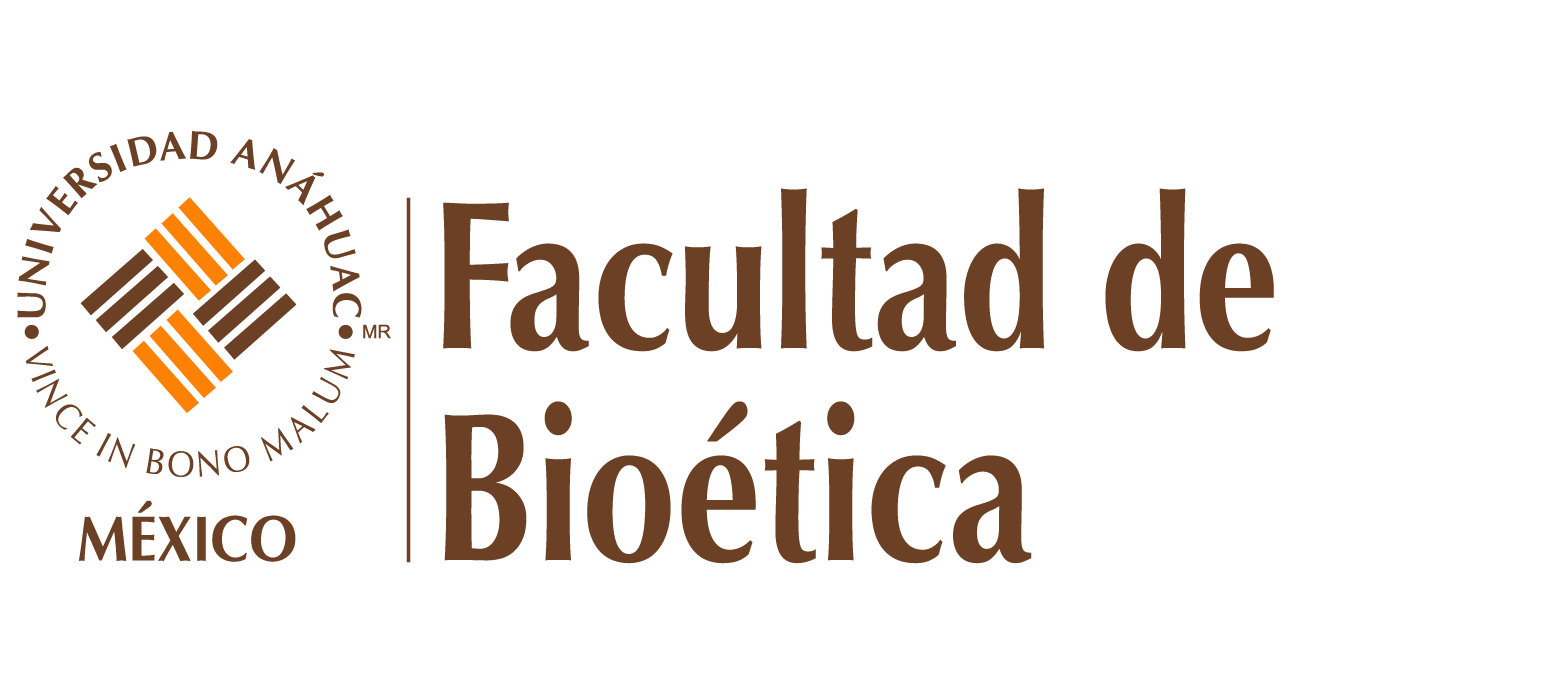Superar divisiones: conocimientos de bioética para navegar la desconfianza y polarización en una era post-covid
DOI:
https://doi.org/10.36105/mye.2025v36n1.01Palabras clave:
COVID-19, dudas sobre las vacunas, OMS, redes socialesResumen
La polarización de opiniones y posturas durante la pandemia de COVID-19 es inconfundible. Aunque hay muchas áreas de debate, nuestro enfoque principal gira en torno a las controversias de la vacuna COVID-19. El Informe SAGE (OMS 2014) sobre la indecisión ante las vacunas enumeró tres factores críticos, complacencia, conveniencia y confianza, que se repitieron durante la pandemia. De ellos, la confianza emerge como el motor central de la polarización. La desconfianza abarca varias dimensiones: el gobierno, la ciencia, las empresas farmacéuticas, las nuevas vacunas y las fuentes de información vinculadas a los grupos homólogos y los medios sociales. La polarización no se debe a la escasez de información, sino que está profundamente entrelazada con la identidad social. El efecto de cámara de eco exacerba este fenómeno, reforzando las creencias dentro de círculos afines. El documento explora cómo las diferentes facetas de la confianza influyeron significativamente en la indecisión ante las vacunas durante el COVID. Por último, es necesario reevaluar la eficacia de los mandatos de vacunación y el control de las redes sociales: ¿reducen las dudas o empeoran inadvertidamente la polarización al erosionar la confianza?
Descargas
Referencias
Tham J. Why is the Covid-19 Pandemic Unprecedented? In: Bioethics during the COVID-19 Pandemic. Cambridge Scholars Publishing; 2022.
Vitale A. All’ombra del Covid-19. Guida critica e biogiuridica alla tragedia della pandemia [Internet]. Il Cerchio. 2022 [citado 15 de mayo de 2024]. Disponible en: https://www.ibs.it/all-ombra-del-covid-19-libro-aldo-rocco-vitale/e/9788884746450
World Health Organization. Report of the Sage Working Group on Vaccine Hesitancy [Internet]. [citado 5 de mayo de 2024]. Disponible en: https://thecompassfor-sbc.org/wp-content/uploads/sage_working_group_revised_report_vaccine_hesitancy.pdf
Gerberding Julie L., Haynes Barton F. Vaccine Innovations. Past and Future. New England Journal of Medicine. 2021; 384(5):393–6. https://doi.org/10.1056/NE-JMp2029466 DOI: https://doi.org/10.1056/NEJMp2029466
Jacobson RM, Targonski PV, Poland GA. Why is evidence-based medicine so harsh on vaccines? An exploration of the method and its natural biases. Vaccine. 2007; 25(16):3165–9. https://doi.org/10.1016/j.vaccine.2007.01.049 DOI: https://doi.org/10.1016/j.vaccine.2007.01.049
World Health Organization. Vaccine hesitancy: A growing challenge for immunization programmes [Internet]. 2015 [citado 5 de mayo de 2024]. Disponible en: https://www.who.int/news/item/18-08-2015-vaccine-hesitancy-a-growing-challenge-for-immunization-programmes
Murdan S, Ali N, Ashiru-Oredope D. The Pharmaceutical Journal. 2021 [citado 5 de mayo de 2024]. How to address vaccine hesitancy. Disponible en: https://pharmaceutical-journal.com/article/ld/how-to-address-vaccine-hesitancy
Sapienza A, Falcone R. The Role of Trust in COVID-19 Vaccine Acceptance: Considerations from a Systematic Review. Int J Environ Res Public Health. 2022; 20(1):665. https://doi.org/10.3390/ijerph20010665 DOI: https://doi.org/10.3390/ijerph20010665
Yaqub O, Castle-Clarke S, Sevdalis N, Chataway J. Attitudes to vaccination: A critical review. Social Science & Medicine. 2014; 112:1–11. https://doi.org/10.1016/j.socscimed.2014.04.018 DOI: https://doi.org/10.1016/j.socscimed.2014.04.018
Bolsen T, Palm R. Politicization and COVID-19 vaccine resistance in the U.S. Prog Mol Biol Transl Sci. 2022; 188(1):81–100. https://doi.org/10.1016/bs.pmbts.2021.10.002 DOI: https://doi.org/10.1016/bs.pmbts.2021.10.002
Evidence-based medicine: how COVID can drive positive change. Nature. 2021; 593(7858):168–168. https://doi.org/10.1038/d41586-021-01255-w DOI: https://doi.org/10.1038/d41586-021-01255-w
Jennings W, Stoker G, Bunting H, Valgarðsson VO, Gaskell J, Devine D, et al. Lack of Trust, Conspiracy Beliefs, and Social Media Use Predict COVID-19 Vaccine Hesitancy. Vaccines. 2021; 9(6):593. https://doi.org/10.3390/vaccines9060593 DOI: https://doi.org/10.3390/vaccines9060593
Nichols T. The Death of Expertise: The Campaign against Established Knowledge and Why it Matters. Oxford University Press; 2017.
Mønsted B, Lehmann S. Characterizing polarization in online vaccine discourse. A large-scale study. PLOS ONE. 2022; 17(2):e0263746. https://doi.org/10.1371/journal.pone.0263746 DOI: https://doi.org/10.1371/journal.pone.0263746
Moody G. Ars Technica. 2016 [citado 6 de marzo de 2024]. Large scale conspiracies are mathematically impossible to keep quiet. Disponible en: https://arstechnica.com/science/2016/02/large-scale-conspiracies-are-mathematically-impossible-to-keep-quiet/
Lewandowsky S, Gignac GE, Oberauer K. The Role of Conspiracist Ideation and Worldviews in Predicting Rejection of Science. PLOS ONE. 2013; 8(10):e75637. https://doi.org/10.1371/journal.pone.0075637 DOI: https://doi.org/10.1371/journal.pone.0075637
Hornsey MJ, Harris EA, Fielding KS. The psychological roots of anti-vaccination attitudes: A 24-nation investigation. Health Psychol. 2018; 37(4):307–15. https://doi.org/10.1037/hea0000586 DOI: https://doi.org/10.1037/hea0000586
Abrams Z.https://www.apa.org.2021[citado6demarzode2024]. Controllingthe spread of misinformation. Disponible en: https://www.apa.org/monitor/2021/03/controlling-misinformation
Romer D, Jamieson KH. Conspiratorial thinking as a precursor to opposition to COVID-19 vaccination in the US: a multi-year study from 2018 to 2021. Sci Rep. 2022; 12:18632. https://doi.org/10.1038/s41598-022-22014-5 DOI: https://doi.org/10.1038/s41598-022-22014-5
Garett R, Young SD. The role of social media in monitoring COVID-19 vaccine uptake. J Eval Clin Pract. 2022; 28(4):650–2. https://doi.org/10.1111/jep.13656 DOI: https://doi.org/10.1111/jep.13656
Harrington B. The Anti-vaccine Con Job Is Becoming Untenable [Internet]. The Atlantic. 2021 [citado 11 de marzo de 2024]. Disponible en: https://www.theatlantic.com/ideas/archive/2021/08/vaccine-refusers-dont-want-blue-americas-respect/619627/
Tavernise S. Vaccine Skepticism Was Viewed as a Knowledge Problem. It’s Actually About Gut Beliefs. The New York Times [Internet]. 2021 [citado 11 de marzo de 2024]; Disponible en: https://www.nytimes.com/2021/04/29/us/vaccine-skepticism-beliefs.html
Shivaram D. 1 in 10 Americans say the COVID-19 vaccine conflicts with their religious beliefs. NPR [Internet]. 2021 [citado 11 de marzo de 2024]; Disponible en: https://www.npr.org/2021/12/09/1062655300/survey-religion-vaccine-hesitancy-exemptions
Henkel L, Sprengholz P, Korn L, Betsch C, Böhm R. The association between vaccination status identification and societal polarization. Nat Hum Behav. 2023; 7(2):231–9. https://doi.org/10.1038/s41562-022-01469-6 DOI: https://doi.org/10.1038/s41562-022-01469-6
Sween L, Ekeoduru R, Mann D. Ethics and Pitfalls of Vaccine Mandates. ASA Monitor. 2022; 86(2):24–5. https://doi.org/10.1097/01.ASM.0000820360.59397.c2 DOI: https://doi.org/10.1097/01.ASM.0000820408.65886.28
Bazerman M, Tenbrusel A. Blind Spots: Why We Fail to Do What’s Right and What to Do about It. Princeton: Princeton University Press; 2012. DOI: https://doi.org/10.1515/9781400837991

Descargas
Publicado
Número
Sección
Licencia
Derechos de autor 2025 José Tham

Esta obra está bajo una licencia internacional Creative Commons Atribución-NoComercial-CompartirIgual 4.0.
Medicina y Ética se distribuye bajo Licencia Creative Commons Atribución-NoComercial-CompartirIgual 4.0 Internacional.
El autor conserva los derechos patrimoniales sin restricciones y garantiza a la revista el derecho de ser la primera publicación del trabajo. El autor es libre de depositar la versión publicada en cualquier otro medio, como un repositorio institucional o en su propio sitio web.


























